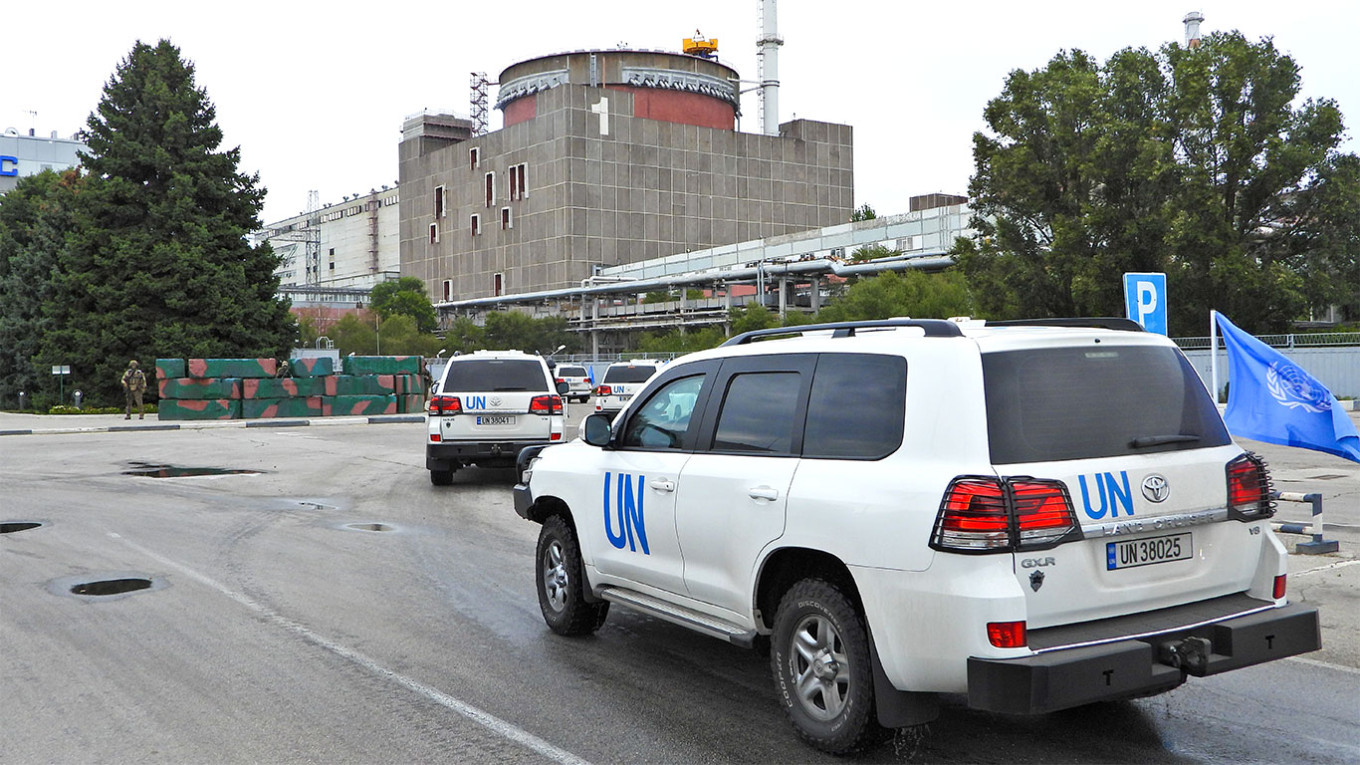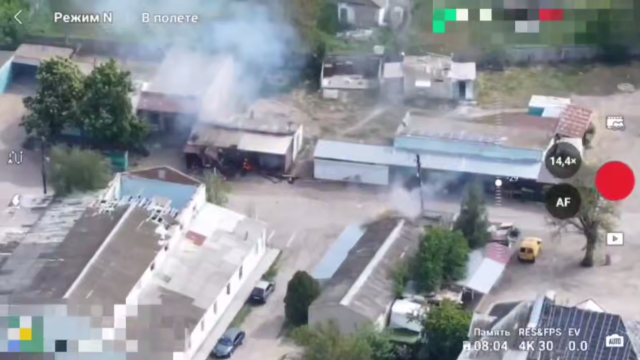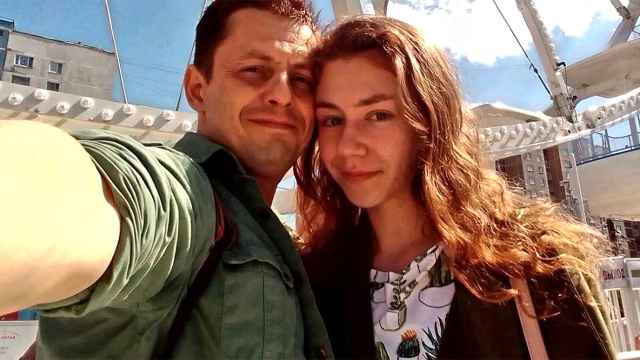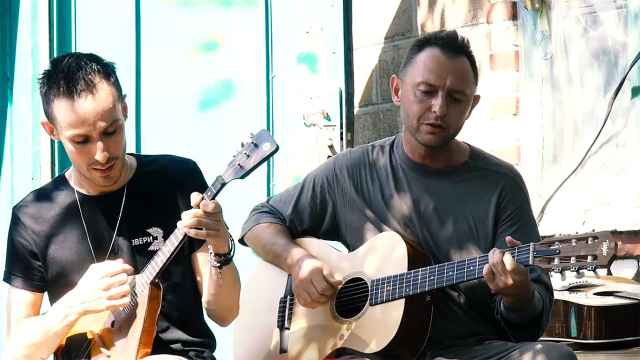UN inspectors arrived at a Russian-held nuclear plant in southern Ukraine Thursday despite an early shelling attack, as the ICRC warned the consequences of a strike on the facility could be "catastrophic".
After crossing the frontline into Russian-held territory, the 14-strong team from the International Atomic Energy Agency (IAEA) reached the facility around 3:00 pm, the agency said on Twitter.
"IAEA's support and assistance mission to #Zaporizhzhya (ISAMZ) led by Director General Rafael Grossi has just arrived at Zaporizhzhya nuclear power plant to conduct indispensable nuclear safety and security and safeguards activities," it said.
Wearing bright blue flak jackets and helmets, they had vowed to press ahead to reach Europe's biggest nuclear facility despite early-morning shelling in the area that forced the closure of one of its six reactors.
Energoatom, Ukraine's nuclear agency, said it was "the second time in 10 days" that Russian shelling had forced the closure of a reactor.
It said the plant's emergency protection system kicked in shortly before 5:00 am (0200 GMT), shutting reactor five, "due to another (Russian) mortar shelling" and that a backup power supply "was damaged" in the attack.
The area around the plant, which lies on the southern banks of the Dnipro River, has suffered repeated shelling, with both sides blaming the other, sparking global concern over the risk of an accident.
'Stop playing with fire'
"It is high time to stop playing with fire and instead take concrete measures to protect this facility... from any military operations," ICRC chief Robert Mardini told reporters in Kyiv.
"The slightest miscalculation could trigger devastation that we will regret for decades."
After Russian forces seized the plant on March 4, Energoatom shut two reactors, followed by a third after shelling on August 5. With a fourth in repairs, Thursday's incident leaves only one of the six reactors working.
Mardini said it was "encouraging" the IAEA team was going to inspect the plant because the stakes were "immense".
"When hazardous sites become battlegrounds, the consequences for millions of people and the environment can be catastrophic and last many years," he said.
On leaving Zaporizhzhia, the IAEA chief said his team would be travelling through areas where "the risks are significant" but had decided to go ahead anyway.
"We have to proceed with this. We have a very important mission to accomplish."
Shelling, saboteurs and back-to-school
The town of Energodar which is located next to the plant came under sustained attack at dawn, with Russian troops firing "mortars and using automatic weapons and rockets", its mayor Dmytro Orlov said on Telegram.
But Moscow accused Kyiv of smuggling in up to 60 military "saboteurs", saying they reached the area near the plant at dawn and that Russian troops had taken "measures to annihilate the enemy".
Grossi has said the IAEA will seek to establish a "permanent presence" at the facility "to prevent a nuclear accident and preserve the largest nuclear power plant in Europe".
Ukraine has accused Russia of deploying hundreds of soldiers and storing ammunition at the plant.
Meanwhile, Ukrainian troops pressed ahead with a counter-offensive in the nearby region of Kherson to retake areas seized by Russia at the start of the invasion.
In its morning update, the presidency said "heavy explosions continued for the last 24 hours" across Kherson, while five people were killed and 12 others wounded in the eastern Donetsk region.
Despite the conflict, now in its seventh month, September 1 marked the start of a new school year for children across Ukraine.
Figures from Ukraine's education ministry show 2,199 educational institutions have been damaged in the fighting, with 225 completely destroyed.
Just over half of the 23,000 institutions surveyed by the ministry are equipped with bomb shelters, meaning they can physically reopen, while those without will only offer online learning.
But in Kharkiv, Ukraine's second city, all learning will be online due to constant Russian shelling, the mayor said last month, with a British charity charging Thursday that dozens of its schools had been "targeted".
An investigation by the Centre for Information Resilience found 41 institutions had been "partially or completely destroyed" with researchers finding the shelling "was targeted, rather than a by-product of indiscriminate attacks on civilian infrastructure".
Meanwhile, the Kremlin denounced as "ridiculous" the decision by EU foreign ministers to suspend a 2007 visa facilitation deal with Russia over the Ukraine conflict.
Ministers agreed the measure on Wednesday but stopped short of closing its borders to all Russians, as demanded by Ukraine.
A Message from The Moscow Times:
Dear readers,
We are facing unprecedented challenges. Russia's Prosecutor General's Office has designated The Moscow Times as an "undesirable" organization, criminalizing our work and putting our staff at risk of prosecution. This follows our earlier unjust labeling as a "foreign agent."
These actions are direct attempts to silence independent journalism in Russia. The authorities claim our work "discredits the decisions of the Russian leadership." We see things differently: we strive to provide accurate, unbiased reporting on Russia.
We, the journalists of The Moscow Times, refuse to be silenced. But to continue our work, we need your help.
Your support, no matter how small, makes a world of difference. If you can, please support us monthly starting from just $2. It's quick to set up, and every contribution makes a significant impact.
By supporting The Moscow Times, you're defending open, independent journalism in the face of repression. Thank you for standing with us.
Remind me later.






